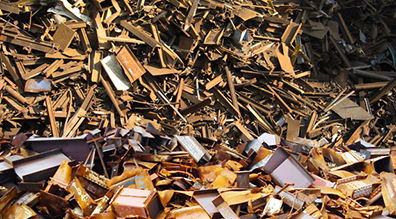
Russia mulls ferrous scrap export ban


The Russian Foundation for Development of Tube Industry (FRTP), which unites the country's largest pipemakers including TMK, OMK and Chelpipe, addressed a letter to economy minister Mikhail Oreshkin on 25 December asking for the prohibition of ferrous scrap exports for six months starting on 1 May. The ministry has agreed to examine the issue, but has not identified any timeframe in which a decision on the matter will be made.
Pipemakers blame exporters for a hike in ferrous scrap purchasing prices and a shortage of material over the past two years. But market participants doubt the measure will be implemented.
The FRTP said in its letter that about 20pc of annual Russian scrap collection was exported in recent years, causing tighter supply in the home market and preventing Russian steelmakers from increasing electric arc furnace (EAF)-based steel production.
Russian EAF steel production has steadily increased over the past four years to 21.4mn t last year from 18.75mn t in 2015. The 2018 utilisation rate of the country's 53 operational EAF's production was about 61pc.
FRTP insists that a ferrous scrap ban would allow EAF-based steel output to rise further to 23.4mn t in 2019, including 5.5mn t by pipemakers. If no ban is introduced, the organisation projects that output will be flat at 21.4mn t, including 5mn t by pipemakers.
But data analysis indicates that Russian ferrous scrap collection has increased over the past four years in line with the rise in EAF output, supported by higher apparent consumption that has also lifted imports. By contrast, export volumes have remained relatively stable over the past four years (see table).
"Collectors are inspired by reasonably high prices, not by prohibitions," one market participant said. "If pipemakers seek ways to reduce prices, they should seek agreements with scrap suppliers — on volumes of purchases, discounts for large-size deals or payment and delivery conditions."
Any export ban could potentially dent domestic scrap collection, which in turn would lead to tighter availability and even higher domestic ferrous scrap prices, which have already increased along with collection and consumption since 2015 (see chart).
The Argus weekly assessed price for A3 grade scrap delivered to central European Russian mills averaged 10,779.29 roubles/t ($163.32/t) fca in 2016, Rbs13,589.75/t fca in 2017 and Rbs16,614.17/t fca last year. In the Urals, averaged prices were respectively Rbs10,269.75/t, Rbs13,271.35/t and Rbs16,218.82/t. A3 prices rose by an average of 23pc on the year in 2018.
Average export prices provided by FRTP showed a very similar increase of 23.8pc over the 2017-18 period (see table). That is because Russian exporters' ferrous scrap dockside prices usually track domestic scrap price trends more closely than export markets, especially in the periods of lower overseas demand, Argus data indicate.
"If the ban is on, steel producers, including pipemakers, will obviously try to trim their scrap buying prices in the wake of no competition with exporters, which add balance to the market. But the effect will rather be to the contrary," a trader said, stating that lower prices might dampen scrap collection and shipments, causing availability to fall and domestic prices to move higher.
"This is quite obvious, so the ministry will be unlikely to recommend a ban on ferrous scrap exports in the short term," another trader said.
Any ban on Russian ferrous scrap exports would have an impact on imported prices in Turkey, which purchases significant deep-sea volumes from St Petersburg and short-sea volumes from Russian Black Sea suppliers. Russian ferrous scrap exports to Turkey totalled 2.3mn t in January-November 2018, accounting for 12pc of Turkey's total 19.03mn t of scrap imports over the same period.


Trump weighs using $2 billion in CHIPS Act funding for critical minerals

Codelco cuts 2025 copper forecast after El Teniente mine collapse

Electra converts debt, launches $30M raise to jumpstart stalled cobalt refinery

Barrick’s Reko Diq in line for $410M ADB backing

Abcourt readies Sleeping Giant mill to pour first gold since 2014

Nevada army depot to serve as base for first US strategic minerals stockpile

SQM boosts lithium supply plans as prices flick higher

Viridis unveils 200Mt initial reserve for Brazil rare earth project

Tailings could meet much of US critical mineral demand – study

Kyrgyzstan kicks off underground gold mining at Kumtor

Kyrgyzstan kicks off underground gold mining at Kumtor

KoBold Metals granted lithium exploration rights in Congo

Freeport Indonesia to wrap up Gresik plant repairs by early September

Energy Fuels soars on Vulcan Elements partnership

Northern Dynasty sticks to proposal in battle to lift Pebble mine veto

Giustra-backed mining firm teams up with informal miners in Colombia

Critical Metals signs agreement to supply rare earth to US government-funded facility

China extends rare earth controls to imported material

Galan Lithium proceeds with $13M financing for Argentina project

Kyrgyzstan kicks off underground gold mining at Kumtor

Freeport Indonesia to wrap up Gresik plant repairs by early September

Energy Fuels soars on Vulcan Elements partnership

Northern Dynasty sticks to proposal in battle to lift Pebble mine veto

Giustra-backed mining firm teams up with informal miners in Colombia

Critical Metals signs agreement to supply rare earth to US government-funded facility

China extends rare earth controls to imported material

Galan Lithium proceeds with $13M financing for Argentina project

Silver price touches $39 as market weighs rate cut outlook

















